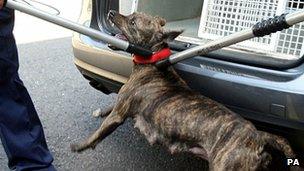Dangerous dogs sentencing guidelines toughened
- Published

Police dog handlers seize a dangerous animal during a raid
Owners of dangerous dogs which harm others in a public place in England and Wales will face tougher punishment under new guidelines.
The Sentencing Council for England and Wales says people who fail to stop their dog harming others should face at least six months in jail.
The guidelines are the first issued to judges and magistrates for convictions under the <link> <caption>Dangerous Dogs Act 1991</caption> <url href="http://www.legislation.gov.uk/ukpga/1991/65/contents" platform="highweb"/> </link> .
The body says there will more jail terms and community orders.
And the guidelines, which follow a public consultation and lobbying from individuals and groups, mean fewer offenders will receive discharges, it says.
Official figures show there has been a rise in recent years in the number of people sentenced for dangerous dog offences, reaching 1,192 cases in 2010.
The NHS has also estimated that dog injuries cost it more than £3m a year, with the number of bites doubling to more than 6,100 between 1997 and 2010.
The <link> <caption>Sentencing Council</caption> <url href="http://sentencingcouncil.judiciary.gov.uk/" platform="highweb"/> </link> issues guidelines to help courts across England and Wales to sentence offences more consistently, within the ranges set out by Parliament.
Last December, the council proposed in a consultation that judges should consider a community order as the starting point for sentencing people who allow a dangerous dog to injure someone.
However, the offence will now have a starting point of six months in jail - and where appropriate judges should consider up to 18 months.
People convicted of possessing a dangerous dog could face up to six months, said the council. It also said that courts should order a dog's destruction unless there is proof it cannot harm again.
The council said the new ranges marked an increase in sentencing levels from current practice.
Although the council's guideline has upped the proposed starting point for serious offences, some offenders could still be discharged from court if they can show they tried to stop an attack.
The guideline does not cover incidents where a dog is deliberately used in an attack because the offender would be charged with assault or a serious violent offence.
It has been extended to include injuries to other animals as an aggravating factor in the offence of allowing a dog to be out of control and causing injury.
The council said that following 500 responses to the consultation, the guideline had been amended to allow judges to increase a sentence where the victim was clearly vulnerable, such as if they were blind.
Anne Arnold, a district judge and member of the Sentencing Council, said courts would be encouraged "to use their full powers when dealing with offenders so that they are jailed where appropriate".
"It also gives guidance to courts on making the best use of their powers so that people can be banned from keeping dogs, genuinely dangerous dogs can be put down and compensation can be paid to victims."
David Cowdrey Campaigns Manager at the Guide Dogs charity said: "We would like to see tougher sentences for dog owners whose dogs attack guide dogs and other assistance dogs, with these attacks treated as an attack on a person.
"Guide dog owners are uniquely disadvantaged. As they cannot see, they cannot anticipate an attack on their dog or easily avoid these incidents. The impact of an attack on a guide dog by another is devastating."
Steve Goody of animal welfare charity Blue Cross called for local authorities to have the power to intervene to control a dog before a serious attack happened.
"The campaign to reform the current Dangerous Dogs Act has been dragging on for some 20 years now," he added.
"We feel that there is an urgent need for preventative action, or dog attacks will continue to increase."
- Published15 December 2011
- Published13 August 2011
- Published4 March 2011